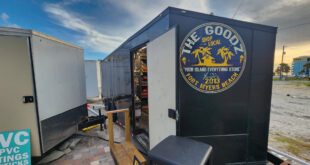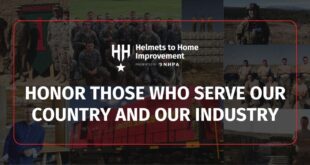Charlston Austin and Warren Pegram knew their plan to open their first store in April 2020 and then four other locations in successive years was ambitious, but their new business launch was much different than they expected.
The owners of Ace Hardware South Fulton in Georgia didn’t think half their staff would leave before the store opened. And they certainly never dreamed a pandemic would force them to postpone their grand opening, limit their ability to stock much-needed products or change how their wholesaler could help them prepare to open.
And yet, while the state of Georgia was under a state-mandated lockdown in an effort to reduce the spread of COVID-19, Ace Hardware South Fulton opened in the Atlanta metro area. As crazy as it seemed to them, the timing turned out to be just right for two retailers to open an essential business and serve a community in quarantine.
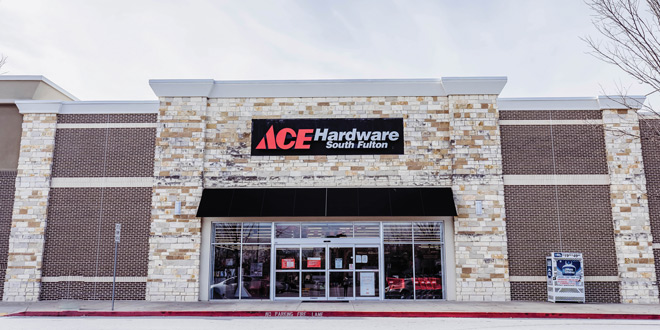 Getting Started
Getting Started
Ace Hardware South Fulton is a new entrepreneurial endeavor for Charlston and Warren, who had no experience in home improvement retail before they opened their 9,000-square-foot store.
Warren currently works as a division manager for a federal agency in Washington, D.C. Charlston, who is his stepson, worked for communications retailers and later opened and operated a car rental business.
Warren wanted to invest in a new venture, and he and Charlston liked the idea of partnering. They investigated restaurant franchises, but Warren felt drawn to home improvement. He previously worked as an aircraft mechanic in the U.S. Air Force and did countless repairs to rental properties he owned.
“When I started doing some research, I thought, ‘This is where we need to be.’ I have mechanical experience and Charlston has retail experience,” Warren says. “We felt hardware was more in line with our personalities and a better fit for our skills and how we do business.”
Charlston now works full time overseeing daily operations at Ace Hardware South Fulton, where he is in the midst of training employees and figuring out an evolving product mix. He is learning as much as possible about the industry, getting to know his customers and working through pandemic-related supply chain challenges.
“It’s been a day-by-day learning experience,” Charlston says.
Warren plans to retain his position with the federal government until he retires. He meets weekly with Charlston to strategize and talk through business challenges. He primarily provides behind-the-scenes support and manages the company’s finances.
 Pandemic Snags
Pandemic Snags
Opening the business during a pandemic created challenges and opportunities Warren and Charlston hadn’t expected.
They opened their business at the end of April 2020, as originally planned. But prior to opening, they had to alter their preparations.
For example, Charlston found many people who were eager for work, but once he built his team of 12 employees, six of them quit showing up to training and stopped returning calls. He had to replace half his staff before the store opened.
Charlston discovered some people were trying to get hired while they were furloughed from other jobs and weren’t planning to stay longer than a few weeks. Within the first five months of business, his turnover rate was almost 100 percent.
Employee training was also a challenge, and not just because the employees left abruptly.
Training that Ace Hardware Corp. typically provides in person at stores had to be moved online due to travel restrictions related to the pandemic. So, Charlston, Warren and watched virtual training on the TV in the breakroom and then went through the store together, applying what they learned.
Ace gave recommendations for best practices on topics like organizing inventory and merchandising. The co-op also provided access to a trainer who coached the team via video.
“Ace emailed me the training materials and we learned it together,” Charlston says. “That probably taught us to be more independent quicker.”
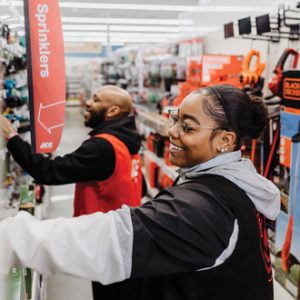 Pandemic Opportunities
Pandemic Opportunities
While the pandemic presented challenges, there were also benefits to being able to set up a store with necessary precautions before customers entered the doors. Charlston and Warren were able to develop thorough store cleaning protocols prior to opening day. They also installed hand sanitizer stations throughout the store and hung signage reminding customers to social distance.
In addition, Warren’s government job went remote, allowing him to be at the store daily for a few months. During this unanticipated time, he was able to build plexiglass sneeze guards for the cash registers, participate in the virtual Ace training and work out his role in the business in person with Charlston instead of from a distance or during nights and weekends. He was also present to offer support during the initial rush of business while most of the rest of the team was in flux.
One of the reasons Charlston and Warren chose South Fulton as the location for their operation was that the community didn’t have a hardware store. Identifying that need before the pandemic opened up opportunities for the store during the crisis.
The pandemic amplified the community’s demand for home improvement products and customers were eager to shop. Ace Hardware South Fulton became a convenient option for buying cleaning supplies and other essentials, as well as the home improvement products they wanted while homebound.
“People were at home and looking for projects to do and we were the only hardware store,” Charlston says. “Thankfully we were allowed to stay open.”
The store’s first several months were chaotic, but being an essential business during a high-need time in the community gave visibility and opportunities to serve it might not have had otherwise.
Charlston could see needs and volunteer the store’s delivery van, parking lot and other resources for urgent uses.
The local chamber of commerce had helped Charlston organize a groundbreaking ceremony prior to the statewide lockdown. At the event, Charlston and Warren met local city council members and the mayor, forming connections that became important quickly.
City officials returned to the store to shop, and Charlston asked them questions about how he and his team could help serve the community.
Soon, Charlston was using the store’s van to haul food and help a local organization provide school lunches to children who still needed meals while the schools were closed. He also supplied free bottled water for participants in a peaceful protest.
When the city began offering free COVID-19 testing to the community, the store parking lot became a temporary testing site. Charlston provided tents from the store’s rental department and gave free bottled water to people getting tested.
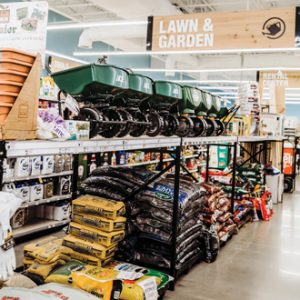 Settling In
Settling In
Connections Charlston made before the store opened and early in the pandemic have served him well. He visited every neighboring business to introduce himself, hand out business cards and forge valuable connections.
An organization located in the same shopping center as the store invited Charlston to participate in its job fair and host interns.
The organization’s nonprofit job training program helps people who have been incarcerated or face other challenges gain work experience and find jobs. Charlston jumped on the opportunities the organization offered.
Providing six internships allowed him to help train local people who needed on-the-job experience before joining the workforce.
All of the interns were motivated to learn even though they didn’t plan to stay at the store, and one of them accepted a job Charlston offered her.
Charlston hopes to expand the number of internships he offers by continuing to work with the job training program and also by recruiting interns from the local high schools. Internships allow him to provide job training as a public service and potentially recruit some employees for the store.
The relationships Charlston has developed with South Fulton city officials have remained important for the business. The mayor and city council members continue to send him suggestions for ways to serve the community and refer customers to the store.
Charlston plans to continue networking in the area to grow Ace Hardware South Fulton and find fresh ways to serve. He believes local homeowners associations are currently untapped avenues for finding new customers for the business.
Just Grow
Ace Hardware South Fulton became profitable shortly after opening, which helped financially when store traffic slowed and customer spending normalized.
By fall, Charlston no longer needed to scramble to get urgently needed products wherever he could find them to meet high demand and make up for pandemic-related supply chain challenges.
In addition, his staff turnover stabilized and customers began returning to more normal shopping habits.
Charlston still needed to learn what business as usual should look like and figure out what his product mix should be day to day instead of primarily reacting to evolving pandemic problems.
He and Warren discussed with customers what they wanted the store to stock while still juggling some supply chain disruptions and learning to plan for seasonal ordering.
“What our customers need is what we’re here to provide,” Warren says. “We have done a good job of listening to our customers, providing them with what they want and serving our community.”
Pandemic challenges haven’t deterred Charlston and Warren from wanting to continue expanding their business.
“I’m happy. This was a great opportunity for me to be in retail and do it for myself,” Charlston says.
Warren and Charlston’s initial plan of opening one store per year for five straight years didn’t start off with the kind of momentum they expected due to the pandemic. However, they plan to look at possible locations for a second store this year.
“The main thing is to get this first store right,” Warren says. “I’ve learned a lot, but Charlston has learned three times as much. Our job is to take our knowledge and just grow.”
 Hardware Retailing The Industry's Source for Insights and Information
Hardware Retailing The Industry's Source for Insights and Information





